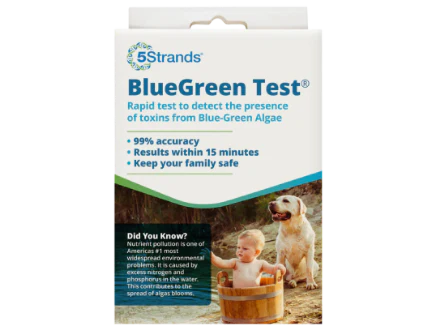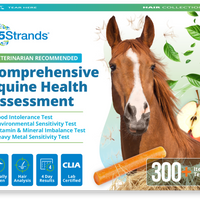It’s that time of year again! We are in full swing of allergy season. Not only do we have to worry about the pollen count, but we also need to worry about how it might be affecting our furry friends. Yes, dogs and cats can have allergies to all the environmental things that we do. I have two shih tzu pups that I have worked through food intolerances with but now that pollen season has hit the south, one of them is exhibiting symptoms again every time she goes outside! I did not have an allergy panel run but did environmental intolerance testing on her and wow! Every grass and tree that was on her list is in my backyard. While we know that there is not much that you can do to prevent environmental allergies or intolerances, knowing what the triggers are and how to combat the symptoms and help alleviate their discomforts is half the battle.
I recently came across an article that was published on BetterPet.com and was given permission to share on our site. It has some great insight on seasonal allergies in dogs. I hope you enjoy reading the article as much as I did.
-Elaine Byers
Did you know your pup can get the springtime sniffles, too? Here’s how to identify and treat your dog’s seasonal allergies.
Written by Kaitlyn Arford - Medically reviewed by Dr. Erica Irish
Original Article Link: https://betterpet.com/seasonal-allergies-in-dogs/
Updated March 15, 2022

Sniffling and sneezing are normal annoyances for humans during the spring and fall seasons, but your dog may be bothered by seasonal allergies, too. If you notice your four-legged friend is scratching more than normal or suffering from a runny nose, it’s possible that seasonal allergies are to blame.
Here’s how to identify seasonal dog allergies and help your pup manage their most annoying symptoms, like sniffles, sneezes, and itchy skin.
Seasonal dog allergies
Seasonal allergies in dogs happen when pups inhale or come into contact with something they’re sensitive to. Allergies are caused by the immune system’s hypersensitivity to an allergen. When your dog comes into contact with an allergen in their environment, they experience a reaction that then triggers other reactions throughout their body, kind of like an alarm system.
Seasonal allergies are caused by environmental allergies. Some, like dust and mold, are year-round concerns, while others are only present during certain seasons.
Most often, your pooch’s allergies can be traced back to either tree pollen or the saliva of fleas and ticks, both of which can cause your pup to experience an allergic reaction. Pups that are allergic to fleas and ticks suffer from a condition known as flea allergy dermatitis, which can be fairly common. But seasonal dog allergies can also be brought on by other factors, too, like plants, weeds, and fresh grass.
In dogs, symptoms of allergies can range from mild to severe. Some pups might sneeze more often than usual while others might require immediate medical care.
Itchy skin is the most common and obvious sign that your pet is experiencing an allergic reaction. You’ll often see your pup either itching all over their body or in one area, like the armpit, groin, or muzzle. Some dogs might also chew on their paws.
Signs and symptoms of seasonal allergies
As in humans, the symptoms your pup experiences will depend on the extent of their allergy and what they came into contact with. A few of the most common signs and symptoms include the following:
- Red, watery, or swollen eyes
- Runny nose or a swollen muzzle
- Trouble breathing
- Coughing
- Itchy, flaky, red skin
- Scratching
- Fur loss
- Biting, excessive licking
- Vomiting or diarrhea
- Chronic ear infections
According to one study, dog allergies have even been linked to problem behaviors like mounting, hyperactivity, begging, attention-seeking, and excessive grooming. This research suggests that more intense allergy symptoms can create psychological stress for dogs.
The Merck Veterinary Manual also states that about 15% of dogs with allergies develop inflammation inside their nose. Eventually, this inflammation can cause a dog to develop asthma.
Allergies can also lead to secondary infections like staph. As your dog licks or scratches, they can break through their skin. This damage can leave them vulnerable to a variety of yeast and bacterial infections.
👉 These symptoms could be a sign of an underlying condition. Always speak to your veterinarian to get a diagnosis.

Springtime pollen can cause pups to experience allergy symptoms like itchy skin.
Dog breeds that are susceptible to seasonal allergies
Dogs of any breed, age, and background can experience allergies. Some pups can even inherit certain allergies. Some breeds that are most susceptible include:
- Chinese shar-peis
- Dalmatians
- Pit bulls
- Pugs
- Golden retrievers
- Labrador retrievers
- Setters
- Shih tzus
- Scottish terriers
- West Highland white terriers
Other common types of allergies in dogs
In addition to seasonal allergies, dogs can experience reactions to things like medicine and food. Many kinds of dog allergies can be challenging for their owners, and the symptoms of different types can overlap. Below are some of the most common types of reactions to watch out for in your pup:
- Skin atopy. This type of allergy is extremely common. Skin allergies are also known as atopic dermatitis and, according to the Merck Veterinary Manual, affect about 10% of dogs.
- Food allergies. Dogs that have food allergies tend to be sensitive to one of the protein sources most commonly found in dog foods, like beef, chicken, or pork. These allergies can even affect your dog’s digestive system and can develop spontaneously.
- Medical allergies. Dogs can be allergic to certain kinds of medications. It’s also possible that the symptoms you think are allergies can be attributed to an underlying medical concern.
When to see a vet
If your dog has an allergic reaction, you need to take them to the vet. Your veterinarian is the only person who can diagnose your dog and get them the help they need. It’s always best to check in with your vet so they can help your canine companion feel their best.
A vet will be able to identify the underlying cause of your pet’s symptoms. Seasonal allergies may be to blame, but general dog allergies can also be caused by food, fleas, and more.
Always see your veterinarian if you’re concerned about your dog’s health.
👉 If you notice that your pup is extra itchy or has dry skin or open wounds, take them to the vet as soon as possible.
Dogs can experience anaphylactic shock
The most worrisome part of any dog allergy is the possibility that your canine companion could go into anaphylactic shock. This severe allergic reaction is extremely life-threatening since it affects your dog’s airways. A few symptoms to watch out for include excessive drooling, seizures, vomiting, sudden diarrhea, and shock.
This kind of reaction can happen after your beloved pup is stung by a bee on a walk. Thankfully, anaphylactic reactions are rare.
If your dog experiences anaphylaxis, it’s a medical emergency. These reactions can be fatal if left untreated, but as long as you seek treatment immediately, your dog should experience a full recovery.
👉 If your dog experiences an anaphylactic reaction, get them to your veterinarian or an emergency veterinary hospital immediately.

A pup waits to be examined at a vet clinic.
Diagnosing seasonal dog allergies
Your veterinarian will rule out other causes for your dog’s allergy first. Be prepared to have a conversation with them about your pet’s history, any recent incidents, and when you first noticed their symptoms.
Your veterinarian has a variety of methods they can use to determine if your dog is experiencing a seasonal allergy. They will likely begin with a physical examination and check for any fleas, mites, or bugs that could be causing the problem. Your vet will likely recommend a flea and tick medication if your dog isn’t already on one. Your vet may also consult specialists to perform laboratory tests.
They may recommend that you take your dog to a board-certified veterinary dermatologist for skin testing. Skin testing will determine what your dog is allergic to by testing their reaction to different allergens.
Your veterinarian may choose to do allergy testing to discover what’s causing your dog’s reaction, or at least narrow down the list of possibilities. That said, these tests are more typically performed in the case of food allergies.
Your vet may also attempt immunotherapy to help your dog better tolerate environmental allergens. They may give your pup an allergy shot (allergy vaccine) through either injections or drops. Allergy vaccine shots help but don’t cure dog allergies, so you’ll still need to manage your pup’s symptoms.
Vets may prescribe your pup an allergy relief medication to ease their pesky symptoms. For severe allergies, they may prescribe an antibiotic or antifungal medication. For more extreme allergic reactions, they may prescribe steroids.
With that said, keep in mind that dogs can be allergic to several different allergens at the same time. Your veterinarian knows best, so chat with them about a course of action.
How to treat seasonal allergies in dogs
Managing seasonal allergies in dogs is very similar to managing them in people. The first step is to reduce your dog’s exposure to various allergens. Your goal is to at least alleviate, if not eliminate, your dog’s symptoms. Treatment depends on what exactly is causing your dog’s allergy. In general, the following tips should help.
Tips for treating your dog allergies at home
Change your daily routine — Avoid taking walks together early in the morning or in the late afternoon, when pollen in the air is at its peak. If you can, avoid fields, parks, and other outdoor spaces that tend to have more allergens.
Remove allergens after walks — When you get home from a walk, remove any pollen on your pup’s fur and face with a hypoallergenic pet wipe or gentle dish soap on a wet washcloth.
Check your pup for bugs — When bugs are most active, it’s easy for your dog to accidentally bring them inside. If you find ticks, remove them immediately. If you find fleas or flea dust, you’ll likely need to pick up some veterinary-grade products or even a prescription. Always keep your dog updated on their flea and tick medications.
Clean your home — The surfaces of your home can trap allergens. Vacuuming and dusting regularly can help prevent dust and other allergens from building up, as can replacing your air filters.
Give your dog a bath — Scrubbing your pooch down with a dog shampoo can wash away any built up pollen on your pup’s skin and fur. Make sure the water is warm but not too hot so as not to dry out or irritate their skin. Medicated shampoos can also be a great option, and some even include antihistamines.
Moisturize their skin — After that luxurious bath, try using a natural moisturizer or DIY anti-itch spray to give your dog’s dry, itchy skin some relief. Coconut oil can be particularly beneficial to hot spots, and dog paw balms can help soothe dry, cracked paws.
Try a probiotic supplement — Probiotic supplements don’t cure allergies, but the vitamins they contain (like zinc) can help soothe your dog’s hot spots or itchy skin. Pet parents report that a multivitamin like this option from Natural Dog Company helped control their pup’s allergy symptoms. For a natural method, ask your vet if your pup could benefit from a dog allergy supplement, like Premium Care’s Aller-Immune Chews.
Try an over-the-counter medicine — Dogs can take oral medication like Zyrtec and Benadryl for allergies, but you’ll need to speak to your vet first. Keep in mind that allergy relief medication helps control symptoms but doesn’t cure allergies.
Talk to your vet about steroids — If recommended by a veterinarian, steroids can help manage allergies. However, steroids can come with side effects, so they aren’t used long term. Vets can also prescribe anti-itch medications like Apoquel and Cytopoint that have fewer side effects.
Ask about an allergy serum — If your dog is experiencing moderate to severe symptoms of seasonal allergies, a veterinary dermatologist may decide to prescribe an allergy serum as part of immunotherapy. This treatment will require at-home injections, which your vet can show you how to administer.
👉 Many prescribed and over-the-counter medications have side effects, so always talk to your veterinarian before giving your dog something new.
How to prevent an allergic reaction
There’s no cure for seasonal allergies, so you can’t prevent your dog from experiencing an allergic reaction. The best you can do is try to avoid allergens and pay attention to your dog’s symptoms.
While seasonal allergies are an unavoidable occurrence, you can try to increase your dog’s overall well-being. Implementing these prevention techniques, working with a veterinarian, and treating your dog’s symptoms at home will keep them comfortable and help them live a long and healthy life.
Frequently asked questions
What can I give my dog for seasonal allergies?
Dogs can take over-the-counter medications like Zyrtec and Benadryl. Your pup may also benefit from an allergy supplement that can help treat and soothe their itchy skin. If you’re looking for a more natural solution, coconut oil can sometimes be applied topically to a dog’s hot spots. As with any treatment, it’s best to always check with your vet to determine what might work best for your pup.
When is allergy season for dogs?
Seasonal allergies in dogs are commonly caused by tree pollen or flea and tick salvia. Both tend to be most active during the spring and summer, which is when your pup is most likely to experience a reaction. That said, a dog can have an allergic reaction at any time of year.
How are allergies in dogs treated?
In order to treat your dog’s allergies, your vet will first need to find and treat the cause. Once your dog is no longer exposed to their allergen, their symptoms should stop. That said, if the cause can’t be identified or avoided, your vet may turn to a number of treatments. A few of the most common include over-the-counter medications, steroids, supplements, and allergy serums.
What are the symptoms of seasonal allergies in dogs?
The most common allergy symptom in dogs is itchy skin. In addition, some dogs may experience a runny nose, red eyes, loss of fur, chronic ear infections, and more. If you notice any of these symptoms in your dog, it’s best to head to the vet to determine what might be going on.
What is the best remedy for a dog with severe skin allergies?
The solution to your dog’s itchy skin will likely depend on what’s causing it. That said, some solutions to try may include a probiotic or allergy supplement. A soothing bath and gentle oatmeal shampoo could also help.

While this article was referencing allergies in dogs, most of it applies to intolerances too. The symptoms of allergies and intolerances overlap. Unless you do some type of testing, you are not going to know for sure which it is.
5Strands Affordable Testing only tests for Intolerances-which are non-immune system responses. Since this is considered an at-home testing kit, it is more affordable than the traditional blood-serum testing or intradermal testing. Some of our customers will start out with the intolerance testing and try to alter their pets diet and lifestyle accordingly. If that is not enough to make a difference, then they will work their way up to the next level of testing which is blood serum testing. If that does not help then they will see the doggie dermatologist for intradermal testing. This pathway makes a bit more sense for most as it starts with the least expensive and least invasive and then works up to the most expensive and most invasive testing.
🐾 Time to give your pet a voice. The 5Strands PET ENVIRONMENT INTOLERANCE TEST offers intolerance testing to 105 items: plants, grass, flowers, essential oils, fabrics, cleaning solutions, etc. The results will create an avoidance guideline, saving you time and money!

Your answers are just a few strands of hair away!



























